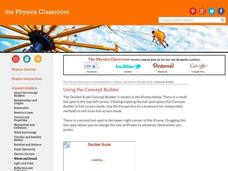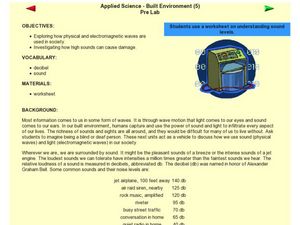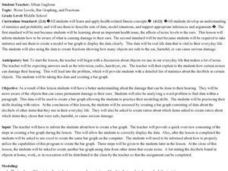Physics Classroom
Decibel Scale
Turn it up! Sound scientists explore the decibel scale through an interactive that calculates movement up and down the scale. Part of a series of interactives that explore sounds and waves, the resource includes a help feature to support...
Purdue University
Sound Absorption Wall
What types of materials absorb sound? Learners explore sound waves, the decibel scale, and how different materials affect sound. Then, they use their knowledge of sound meters to complete a STEM engineering design task to build...
Urbana School District
Sound
Beautiful music doesn't just write itself, but if you ever feel bad about procrastinating, remember that Mozart wrote the overture to Don Giovanni the morning it premiered. Introduce young scientists to the elements of sound including...
Acoustical Society of America
Sound Measures
How loud is the class's hearing threshold? Using a sound level meter, the class members observe how the loudness of sound is affected by distance. Learners continue to study decibels by seeing how different sounds compare to each other...
Acoustical Society of America
How Loud Is Too Loud?
How loud was that? Individuals build wheels displaying different sounds. Then, learners use the wheels to find the number of decibels the sound creates and how long they could withstand the sound before potential hearing damage.
Curated OER
Sound Busters
Fourth graders engage in a study of sound pollution at their school. After a class discussion on what noise pollution is, learners are asked if they think there are areas of their school or community where noise pollution is a problem....
Curated OER
Sound
In this sound worksheet, students understand how sound is created and how the human ear "hears." Students compare the frequency, amplitude, and speed of sound. Then students complete 10 matching, 7 fill in the blank, and 11 short answer...
Curated OER
Sound
In this sound worksheet, high schoolers read about sound waves, how they are graphed, what frequency is and how it's related to pitch and the speed of sound. Students solve 8 sections of problems including matching terms related to sound...
Curated OER
TE Activity: Sound Line
Students investigate the decibel readings of various noises. They determine why high-level readings damage hearing. Students arrange sound from the lowest to highest decibel levels when they written on a piece of paper.
Curated OER
HW Unit 10:5-Sound
For this sound worksheet, students answer 17 questions about sound, the wavelength of sounds, the frequency of sounds, the speed of sound, the types of sound waves and the effects of the medium sound travels through on its speed.
Green Education Foundation
How Loud is Too Loud?
Ever wonder how loud a sound has to be to cause damage? Young scientists explore sound properties by researching decibel levels. They discuss how sound is perceived by our ears and our brains and why it can cause negative health effects...
Curated OER
How Loud Is Loud?
Students, after approaching the concept of sound, brainstorm a list of as many objects and creatures that they can think of that make sounds and draw and illustrate each one. They research information about decibels and how levels of...
Purdue University
Design of Music Instruments for a Rock Band
Can you create a rock band? Scholars learn about the creation and transmission of sound in a hands-on STEM activity. First, they explore the transmission of sound using a tuning fork. Then, they must solve the problem of missing...
Curated OER
Applied Science - Built Environment (5) Pre Lab
Fifth graders look at the impact of sound and noise. In this sound lesson, 5th graders review the decibel and common sounds along with their noise levels. They complete a worksheet about the different sounds that one might hear during...
Curated OER
Design an Instrument
Students design an instrument. In this sound, vibration and pitch lesson, students learn about the characteristics of sound, vibration and pitch. Students design a guitar using the assembled craft materials and demonstrate how they...
Rochester Institute of Technology
Artificial Hearing
Your sense of hearing depends upon tiny hairs deep inside your ear and if you lose these hairs, you lose your hearing. Here, groups explore hearing through the decibel measurement of common sounds. As a class, participants discuss...
Curated OER
Lesson 3-Explore/Explain Do You Hear What I Hear?
Students explore how loudness is measured. They identify the decibel scale and explain the amplitude of the sound wave.
Curated OER
Do You Hear What I Hear?
Learners study hearing and are able to differentiate between different sound waves. In this sound wave lesson students develop a cause and effect model that shows the parts of the ear.
Curated OER
Barnyard Bingo
Students explore farm animal sounds. They sing a song that introduces them to the sounds of farm animals. Students create animal bingo cards to help them recognize the correct sounds for each of the farm animals. They discuss the types...
Curated OER
How We Hear
Students study how sounds are transmitted from the environment to the brain. For this investigative lesson students participate in activities that show them how we hear, what sound waves are and the difference in seeing and feeling...
Curated OER
Harmonic Motion Equations
In this harmonic motion activity, students use the equations for the speed of a wave and speed of sound to complete 9 problems and 9 fill in the blank questions.
Discovery Education
Market Research and Design: The Headphone Challenge
Watch augmented reality bring classrooms to life. Scholars work in groups to design, build, and market a new pair of headphones meant for children under three. They use an augmented reality app to show their headphones in action as they...
EngageNY
Logarithms—How Many Digits Do You Need?
Forget your ID number? Your pupils learn to use logarithms to determine the number of digits or characters necessary to create individual ID numbers for all members of a group.
Curated OER
Noise Levels, Bar Graphing, and Fractions
Students research items that can damage hearing. They explore statistics about the decibels of certain objects. From the information collected, students create a bar graph. They formulate ratios to determine what sounds are harmful to...























